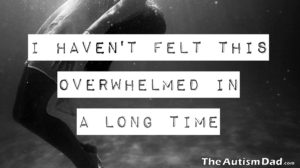It’s the 1st of September and we brought it in with a day full of manipulation and tantrums.
Gavin is extremely manipulative. Ask any parent with a child that has reactive attachment disorder or conduct disorder and they will likely tell of a similar story.
I’m just going to focus on the most recent events. They start off with Gavin caught trying to manipulate Elliott into wanting to play video games. As you know, Gavin is not allowed to play video games very often, because he gets too upset and he also has epilepsy, so that’s a concern as well.
On occasion, we allow him to help his brothers while they are playing a game. This allows Gavin to play, but in a limited capacity. This is one of those things that you will just have to accept, is in place for good reason.
What Gavin was trying to do was convince Elliott to play Super Mario Sunshine. The moment that Elliott would decide to play, Gavin would come running down the steps and ask if he could help Elliott.
Unfortunately, this happens all too often.
Usually, Elliott picks up in this and will come tell us. However, Gavin has been improving his manipulative skill and so Elliott doesn’t always catch on right away.
When we realized what was happening, I called Gavin down, in order to speak with him about this.
I asked him what had happened. Gavin has a tell, and it’s most obvious when he’s been caught red handed. He will begin trying to break his fingers by bending them all the way back son that they touch the top of his hand. He will also start twisting his legs and become all tensed up.
This is how we know for sure what happened.
I told Gavin that he is not allowed to manipulate or trick his brothers or anyone else into doing something that he wants them to do.
I informed him that he would be losing his choice for dinner tonight.
Upon hearing those words, Gavin in had a huge tantrum. Granted, we seen much worse but it was enough to send the boys running and shake the house.
It just so happened that I was too tired to cook tonight so we were having Little Caesars $5 pizzas for dinner. As soon as he realized that, he really let loose.
However, at any point, I was able to ask him what his heart rate was and he would stop and check his watch. After telling me, he would go right back to throwing a fit.
He began the day with problems and ended it the same way. I’m always saddened when this happens because it’s like he’s lost an entire day of his life. I realize that it’s a direct result of the choices he makes but still, it sucks.
This was posted via WordPress for Android, courtesy of Samsungs Galaxy S III. Please forgive any typos. I do know how to spell but auto-correct hate me.
Please join our Autism Help Forums
Look for “Autism Help” app at the Google Play Store



Marc's tell is that his voices changes an octave, and he starts talking really fast. A second one when he is caught doing something is he will run screaming from the room… "Momma"
A punishment that works today won't work tomorrow. We are consistent in that Marc is not allowed access to the Internet. If he is caught using the Internet via the Wii, he loses the Wii for 7 days. If he steals technology from his siblings, he loses the Wii for 7 days. I will be writing about manipulation later this week on my blog.
I have a daughter who shared some of your son's Gavin's characteristics: she was not naturally empathetic, she couldn't really take being called out directly on things she did wrong, and she didn't seem to be able to deal with punishment. When she was younger, she would cycle through this hysterical denial-anger-remorse chain over and over until I was exhausted. The remorse was, as you describe with Gavin, not for whatever she did, but for being punished. I got scared by how I was thrust into this policeman role, how much distance it put between us, how manipulated I felt, and how emotionally taxing it was.
We found that enforcing punishments was not worth it. She spent so much time fighting the punishment itself, that she never had to think about the crime, so to speak. The punishment became the focus, not the acceptability of the action. We found it worked much better to respond with almost no affect (certainly not anger) and ask her to stop what she was doing, give her some time to think about it, and come back at it later. We would have a short discussion about the episode that started out empathetic ("I know it must be frustrating for you when…") and only then got to challenging ("my concern is that your little sister might not know that…"). The child is not considered a malefactor, but a reasonable person who doesn't have the right tools to deal with a difficult situation. You,t he parent, are saying you understand the difficult situation (since Gavin really likes video games, not having access must be amazingly frustrating). You then try to find together a more reasonable way for him to respond. The child may even have good ideas about what that may be (come to you, ask to play a board game, etc.) By this method, the parent is a coach who tries to help the child discover how to handle difficult situations rather than a policeman who wields a big stick when things have gone wrong.
Our daughter, now a few years older than Gavin, has come along beautifully. We haven't had any of those hysterical cycles in more than a year, and she has come over to our side, is the best way I can describe it. It might just be natural cognitive development, who knows. But for whatever reason, my relationship with my daughter has improved a hundredfold. When I was the policeman, we were butting heads constantly and I guess I understand that. This new approach has changed both our lives in huge, positive ways.
It's always hard. Sticking with a punishment when you know it's something they really want. But, the boys have learned I'm a pushover, and they use it against me. Don't let them do that to you.
At least it shows Gavin in thinking… for nefarious reasons, but he's thinking
@jamiainc I suppose that's one way to look at it 🙂